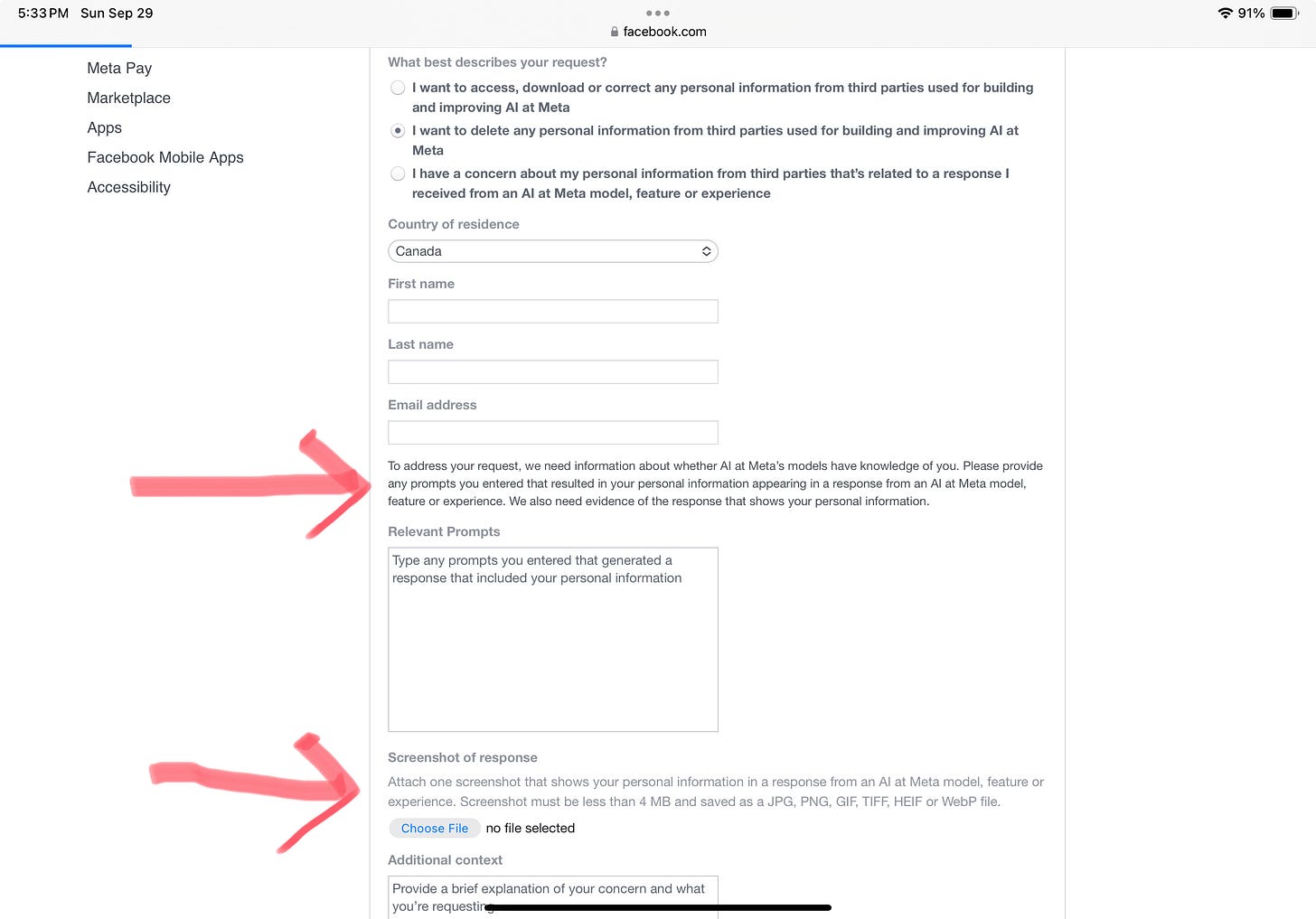The Infuriating Issues with Trying to Escape the AI Ingestion Machine
Plus a new weekly segment FTW
I did not get my promised extras done this week as my wife and I were recruited for 4 days of emergency grandparent childcare. Now wrangling and keeping a 4 year interested for that length of time is much tougher than researching and writing blog posts. But it is much more rewarding, and I really like writing. Seeing my granddaughter’s excitement as she learns about volcanos, her diligence as she helps me chop vegetables for pasta, and her wonder as she wonders through woods and farms is awe inspiring for me. (That is her in normal princess attire in the picture heading my substack). So it was time well spent.
So this week’s morning tonic will actually be in the afternoon. I will get back on track this week and also hope to release the first of my articles about Entrepreneurship. But now on to the awe sapping news.
The Headliner: Opting Your Content Out of the AI Content Training Craze is Not Easy
But for Celebrities Virtue Signalling really means Pay Me the Money
We have all have experienced those ubiquitous long clip and paste statements that litter Instagram and Facebook. Topics ranges from support for (fill in the blanks) medical concern, “put this huge post in and suddenly you will see all your friends again”, and today’s subject, “I own my copyright to my pictures & stop using my data to train your AI”. As I was writing this post a misinformed friend posted something like that to Facebook.
It is in the air as last week opting out of AI training really took off in my LinkedIn and Substack feeds (AI training opt-out links for LinkedIn and for Substack) with the switches being buried deep in the settings. The right way is to have people Opt-In if they want to include their content in each application’s AI activities, instead of a well hidden Opt-Out. But that would require integrity and ethics, something in short supply in Silicon Valley, especially as we will see with Meta.
But here is a case in point about the slippery nature of everyone’s ethics. In June actress Kristen Bell posted one of those Don’t You Dare You Touch My Stuff , I Own the Copyright to My Material on Instagram. She definitely stood up to Meta, helping all of us little people. Isn’t that. . . well, virtuous.
Now of course, shouting at Meta through clip and pastes does NOT protect your rights NOR opt you out of Instagram’s or Facebook’s AI training program. For most other social media products these opt outs are buried deep. But not so for Meta products, unless you live in Europe where they have world class data protection laws, and it still is tricky to accomplish there. In North America and most of the rest of the world there are no options.
Well ok, there are options that no person who understands the concept of time passing would embark upon. Here is what you can do. For Facebook, you can open up your settings and read a long, revised Privacy Policy from Meta, which is what I enjoy doing as the evenings turn cool and autumnal. I swear it took me 5 minutes just to scroll to the bottom of it without ever reading it. Clicking each and every link, and watching the attached videos will consume several fall evenings for sure. Over in the Privacy Center there is more reading material after you click on Generative AI at Meta. Finally, you can get to a form with the simple title of Data Subject Rights for Third Party Information Used for AI at Meta.
Now I have been down this thorny road with Meta before on another issue relating to what qualifies as a news agency in Canada. Basically it is prove to us that your information is in our AI and is harming you. Similar process on Instagram.
But that onerous set of requirements wasn’t that big of a deal for Kristen. She appears to have been using her posting protests as a tool for negotiations. Kristen, along with other celebrities like Keegan-Michael Key and Dame Judi Dench, were recently announced as part of the new voices for Meta AI. Compensation details naturally weren’t disclosed but each voice talent’s contract was estimated at several million dollars. That is the price of virtue today.
But at least I have a new post I can put together to shout at Meta: I WANT OUT or GIVE ME MY MONEY!. You laugh but actually that may be true for all of us. Details in the next article.
Secondi: There will be weapons in the AI wars to come
Even if it just means we all end up like Kristen Bell
There is at least one company that is looking out for those of us who run websites and produce blogs, to help stop the incessant scraping of our data, especially from AI agents. Cloudflare, long one of my favorite companies for ensuring the protection and performance of websites, is releasing a tool suite to help manage all of the robotic crawlers that visit you. For neophytes, crawlers are software tools that look through your website and then do a variety of things with the content they find there. That is how Google, for instance, finds out about your website and its content for its search engine.
But do you really want every possible AI tool to absorb all of your hard work in blogs, studies, and research papers in order for it to possibly produce something based on your ideas in an answer to a question posed to somebody’s favourite AI application? I do not.
Well Cloudflare “customers will have access to a dashboard showing which AI crawlers are visiting their websites and scraping data, including those attempting to camouflage their behavior.” Each customer can then manage every crawler, as they like, permitting some and preventing others from doing their function. Not only that but
“We want to make it easy for anyone, regardless of their budget or their level of technical sophistication, to have control over how AI bots use their content,” says Cloudflare spokesperson, co-founder Matthew Prince.
Evidently Cloudflare is expecting the big payoff to be . . . in payoffs to content providers. It will give all of us a tool to use in negotiating access to our precious content. We’ll all have to up our game to get any real money but I do like stopping the untrammelled access to everyone’s content. Unfortunately it doesn’t apply to Meta products.
FTW
Forget This Word: Gaslighting
Welcome to a new weekly section, Forget This Word. As someone whose grandmother was a proof reader for the University of Aberdeen Press from the early days of last century and whose mother was an English teacher & a consummate book reader, I grew up with a love of the depth, subtlety and nuance of the English language. I prefer word definitions that are well grounded and specific, each adding its special features to a composite of great communication, both spoken and written .
But we live in a time of semantic crisis, where our vocabulary is limited and growing smaller, definitions have become amorphous and ever shifting, resulting in a loss of meaning. Communication is no longer as intimate and connective as it once was. It is not sharp, plain or clear, like that of my semantic hero George Orwell; it seems mostly a type of team signalling exercise. This is a subject I will come back to in a forthcoming series on Semantics in Crisis.
But this weekly feature is about words that rankle and bother me. It can be because of immediate overuse, like weird suddenly appearing constantly after one American VP candidate makes a simple observation using it.
It can also be because of an inflated, ever broader meaning, like the word I’m exhorting us to forget this week (or at least use in a more correct manner), Gaslighting. I literally see it used daily, often multiple times. The implied meaning for what I can infer, is that you disagree with me and you probably are being dishonest or deceitful.
Let’s go back to the source and see if we can’t reclaim this word from its runaway overused meaninglessness It is of course the title of the acclaimed 1944 movie Gaslight with Charles Boyer, Ingrid Bergman and Joseph Cotton. In this movie Charles Boyer marries Ingrid Bergman, a piano player whose Aunt has been murdered (it turns out by none other than Charles Boyer). He embarks on a long program of trying to convince his wife that she is mentally ill using a number of tricks including having the gaslights in their house flicker and go done when he is nominally out of the house. He is actually in the attic looking through her aunt’s belongings for jewels, the reason he killed the aunt in the first place.
In summary then gaslighting is a planned, sustained set of activities to destabilize an intimate in order to achieve crooked or nefarious ends. This is a marvellous word but normally should have quite limited usage.
It is also a brilliant film that holds up well to modern viewing. I recommend it.




